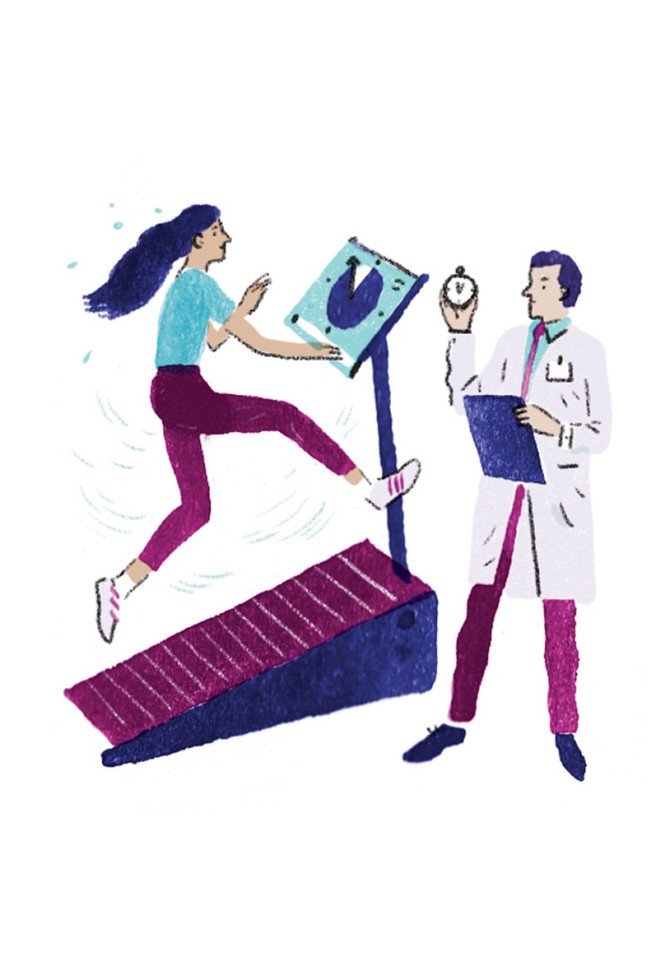4 New Health Numbers You Need to Aim For
Health recommendations can feel like moving targets. Here's what to aim for.
By Dr. Mehmet Oz

Illustration: Peter Oumanski
Pop Quiz: Do you know how low your blood pressure should be? Or when to start getting mammograms? And how much exercise do you really need? There's a benchmark for everything, but as better research gives us a clearer understanding of how to prevent and detect disease, the standards can change. These four new goals can help you stay your healthiest.
50
That's the age at which you should begin getting mammograms if you're not at increased risk for breast cancer, and you can have the test every other year, according to updated guidelines set by the U.S. Preventive Services Task Force (USPSTF), an independent expert panel appointed by the Agency for Healthcare Research and Quality. If you're in your 40s—which is when a previous recommendation said you should start screening and when most insurance plans begin covering mammograms—you'll need to consider whether the benefits outweigh the risk of unnecessary treatment. It may be worth it to begin screening earlier if you have a family history of breast cancer, carry a genetic mutation (like BRCA1 or BRCA2), or underwent radiation therapy to the chest before age 30. All three situations increase your odds, so consult your doctor about more frequent or earlier screening.

Illustration: Peter Oumanski
60
For decades, doctors have been saying the same thing: Get your heart rate elevated for 30 minutes a day, five days a week. That's the current minimum amount of exercise suggested by the American Heart Association in order to reduce the likelihood of heart disease. Well, get ready to adjust your treadmill timer. A 2015 review of the relationship between exercise and heart failure in the journal Circulation found that 60 minutes of moderate-intensity exercise five days a week can cut the chance of heart failure by 19 percent. That's almost twice the 10 percent reduced risk found in people who follow the current advice. A whole hour may seem like a lot, but you don't need to get the extra 30 minutes all at once: Taking the stairs to your office, walking more, and exercising at home during commercial breaks add up.

Illustration: gheatza/istockphoto
10%
If you don't have high cholesterol, you might not know what a statin is. But that's likely to change. Statins, drugs typically prescribed to treat high cholesterol, are now being used to ward off heart disease in patients with no history of the disease. A proposed recommendation from the USPSTF advises that anyone ages 40 to 75 with at least one risk factor for heart disease and a 10 percent or higher chance of having a heart attack or a stroke or dying of heart disease in the next decade should take statins preventively. Why? After analyzing 18 trials, researchers discovered that heart disease risk was significantly lower among those with cardiovascular risk factors who took statins, even if their cholesterol level fell within the normal range. Your ten-year risk can be calculated by your doctor using a tool co-created by the American Heart Association and the American College of Cardiology that's based on factors including age, sex, race, cholesterol levels, blood pressure, and whether you're diabetic or a smoker.

Illustration: Peter Oumanski
120
People with high blood pressure have often been told to aim for a systolic BP (the top number of the reading) of less than 140 mm Hg. But the results of a recent landmark clinical trial, called the Systolic Blood Pressure Intervention Trial (SPRINT), suggest you should be aiming about 20 points lower. The SPRINT study, which included more than 9,300 participants age 50 and older, found the likelihood of a "cardiovascular event" (such as a heart attack or heart failure) was 25 percent lower among those with a systolic pressure of less than 120 mm Hg than for those who hovered closer to 140. The risk of death among those below 120 mm Hg was 27 percent lower, too. Bottom line: If you're over 50 and on blood pressure meds, talk to your doctor about how low you should go.
Mehmet Oz, MD, is the host of The Dr. Oz Show (weekdays; check local listings).
From the April 2016 issue of O, The Oprah Magazine

